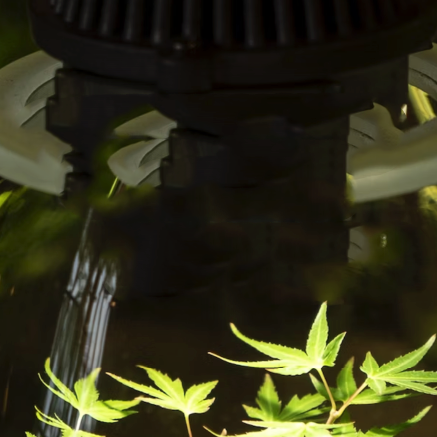Growing as Nature Intended
We've all heard about organic gardening and the crops it produces such as organic vegetables and fruit. We're told that it is more natural and healthier for us to eat as much of our food that has been grown organically as possible. But what exactly is organic gardening?
What does "Organic" mean?
Before we go any further, it seems prudent to define the word "organic".
In the realms of chemistry, the term organic refers to the structure, properties and behaviour of molecules that are based around carbon atoms. Carbon atoms can form different configurations. These are not only limited to graphite, diamond, fullerene (football-shaped structure) and graphene. Carbon atoms can also form rings of many different sizes and chains of almost unlimited length with a multitude of different configurations of side-chains. Each configuration forms the basis of a different compound, with it's own set of characteristics and properties. Add to this that other atoms (particularly hydrogen & oxygen) can "hang" off different parts of the structure, you start to realise why the realm of organic chemistry encompasses a bewildering amount of different molecules. In fact there are many more types of organic molecule than non-organic.
All life is based on these organic compounds, or as Wikipedia puts it: "Organic compounds form the basis of all earthly life".
Technically speaking, we can say that organic means dealing with, and using, only products that contain only carbon-based molecules (that would, most-often times, be derived from forms of life).
So how is it different to normal gardening?
Intensive plant farming involves the use of chemical (salt-based) fertilisers. These dissolved salts provide the basic nitrogen, phosphorus, potassium, calcium, magnesium and sulphur to plants in a very simple and quickly-absorbable form. This has trickled down into domestic gardening as well - have a look on the ingredients on the side of a typical packet of soluble fertiliser that can be found in a gardening or diy shop. They are basically packed with lots of different salts. Intensive farming often involves the use of sometimes rather questionable chemicals to inhibit molds, pests, diseases and weeds.
There are several organisations that give accreditation to organic feeds, soils and pest / fungus control products. Two of the most recognisable of these organisations are Skal and Eco, whose accreditation seals adorn the bottles and bags of many organic products. It is interesting to note that their version of the definition of an organic product is one that is only naturally derived and only from sustainable sources.
Certified Organic Plant Foods and Boosters
The most popular ranges of organic nutrients are BioBizz and Plant Magic Oldtimer.
Our go to is the new boys, British Organic Bio Nutrients.
Weirdly enough, this means that peat is not classed as fully organic because it is not renewable (well, not in any reasonable time-scale at least...). Once peat has been cut, it takes millennia for nature to replace it.
Natural (Bio) Plant Foods and Boosters
The organic products that are useful for feeding our plants would generally be derived from animal bone and blood, fish, vegetables and other plant materials such leaves, seaweed and seeds etc., or manufactured products derived from these things. Manure can be used as well, but I find it difficult to believe that anyone with an indoor garden would use such a thing!
It's not just about the products - it's a whole different methodology...
Organic growing rotates around a whole different philosophy to intensive agriculture. An organic grower looks on his grow as something that is a part of nature and part of a whole eco-system. Growing organically is all about working with nature, rather than relying on chemicals to grow the plant and get it through to harvest. It involves harnessing all the natural processes and lifeforms that occur in the soil. It is about using natural pest repellents, and microbes that arrest the development of moulds. These can be addedto your grow. There are several great products but our favourite is Ecothrive Biosys which is a great all-rounder and provides a complete profile of bacteria and beneficial fungi.
Let's take a quick look at how this works, starting at root-level.
The good bacteria perform a whole host of beneficial jobs. There are strains that fix nitrogen (the N in N-P-K) from the air so that plants can absorb and use it; some strains create humates (natural chelating elements), others break down the organic foods that we water into the soil into plant absorbable molecules and atoms.
Even more fascinating than the bacteria, the beneficial fungi perform remarkable jobs too. Mycorrhizal fungi actually form a symbiotic relationship with a plant's roots. They actually attach themselves to the root and grow along it, helping to protect the root from bad fungi, such as pythium (which causes root-rot). The mycelia (thin, filament-like strands) of the mycorrhizal fungi grow out into the soil, and pass water and nutrients back to root. The plant, in turn, feed the fungus with a little of the sugar that it creates by photosynthesis. Basically, they feed and protect one another.
Another beneficial strain is Trichodermal fungi. These guys actively feed on other fungi like pythium, creating a much nicer environment for the roots.
Beneficial Microbe Additives
An organic grower feeds the soil
The organic farmer tends his micro-herd of beneficial organisms very carefully. He builds up their numbers up by adding them into the soil with products like the Ecothrive Biosys above. He feeds them sugars from products such as Advanced Nutrients Bud Candy. And he feeds natural foods for them to work on, which in turn they feed to the plant. He makes sure not to destroy them by using salt-based plant feeds, the high levels of phosphorous in which is highly toxic to them. And he definitely never uses peroxides or sterilisers which simply kill them stone dead.
Intensive agriculture ignores the natural process. It seeks to grow the plant quickly, cheaply and easily using salts, and to kill pathogens with some pretty nasty chemicals. Soils that have been intensively farmed are bereft of beneficial organisms. After a short period of intensive farming, the soil takes many years to recover so that it could be used for organic farming again.
When all is said and done, both methods of growing do work. Non-organic farming may provide the scope for larger yields, without the fuss of dealing with natural products. However, the non-organic grower may never fully experience the quality and the flavours of his crop that an organic grower might. It's a question of personal choice.

